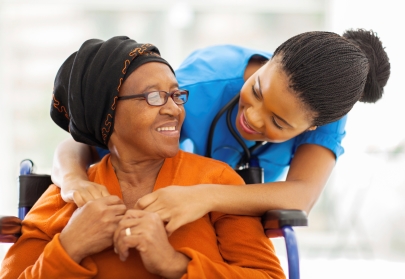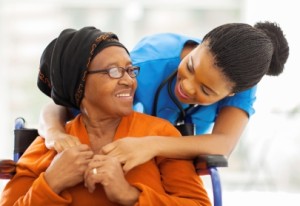
 As the American population is living longer, hospitals are experiencing an increase in the geriatric population — both inpatient and ambulatory care. Kings County Hospital Center is no different, as demonstrated by our patients who are admitted for congestive heart failure. Contrary to popular perception, a significant number of our elderly population are awake, alert, able to care for themselves, deeply religious and they often combine health with divine intervention. Only when we take time to fully engage and listen to patients, can we begin to understand their individuality and as a result create a plan of care that aligns with their needs.
As the American population is living longer, hospitals are experiencing an increase in the geriatric population — both inpatient and ambulatory care. Kings County Hospital Center is no different, as demonstrated by our patients who are admitted for congestive heart failure. Contrary to popular perception, a significant number of our elderly population are awake, alert, able to care for themselves, deeply religious and they often combine health with divine intervention. Only when we take time to fully engage and listen to patients, can we begin to understand their individuality and as a result create a plan of care that aligns with their needs.
Here are some of our patients’ stories:
92-Year-Old Trinidadian Female who states, “I want to go home; laying in this bed makes me lazy. I am used to moving around and doing things.”
92-Year-Old Guyanese Female. When the nurse brought her FOUR medications and offered her water to take her meds, she stated, “I don’t want your water; I have to eat then take one pill; eat again then take the rest the same way. By the way, is there Lasix in the cup? I don’t want it: I was in the bathroom 12 times yesterday.”
84-Year-Old African American Female initially from South Carolina said, “My parents were a step away from slavery and my grandparents were slaves.”
82-Year-Old African American who states on a weekday, “What I am most concerned about is that I will not be able to go to church on Sunday.”
84-Year-Old Patient with Heart Failure brought to the hospital by her children and grandchildren because she refused to take her medicines. When asked why she did not take her medications, she stated, “All the medications make me confused. I am in the bathroom all day because of the water pill. I can’t eat a morsel of anything that I like. So what’s the point?”
78-Year-Old African American Female initially from South Carolina who was dissatisfied with her hospital experience stated, “I picked cotton in the South. I paid my dues and I don’t deserve to be treated this way at Kings County.”
92-Year-Old Female from South Carolina stated “My family picked 300-400 pounds of cotton on a plantation that was not ours. I walked 10 miles to a segregated school, graduated from Voorhees College with an Associate’s degree and came to New York in the 1940s.” She continued her education and became a licensed dietitian. Her two sons were two of five African-Americans who integrated Stuyvesant High School. When offered home care she said, “I don’t want anything that’s not mine.”
89-Year-Old Guyanese Female states that her parents were slaves. Her father was on the tobacco plantation and her mother on the sugar plantation. Can you hear the voices of our patients? If not, have a conversation; you will change your perception of who you think our patients are — to the reality of who they actually are.
“It is more important to know the person who has the disease, than the disease who has the person.” — Hippocrates
Editor’s Note: Dr. Beverley’s program to build cultural competency at Kings County Hospital was a leading contender in the 2014 John Q. Sherman Award competition. You can read more about the success of her patient-centered approaches here. She may be contacted by phone at 646-458-7848 or via email at beverlem@nychhc.org.





8 Comments
I believe patient’s do as well as they are treated by our healthcare providers. If we are calm and answer the actual questions of the patient to let them know we are listening. You have a winning relationship with patient
“With regard to healing the sick, I will devise and order for them the best diet, according to my judgment and means; and I will take care that they suffer no hurt or damage”…Hippocratic Oath
The voices captured in this article tell us the serious concerns of the sick and in this case the sick elderly…individuals who have survived the Great Depression, Wars, birth and death of loved ones and many prior illness of their own…when it comes to their healing they require specific input from their own experience and the providers willingness to listen and carry-out, sometimes very simple requests from the elderly which will ensure compliance and possibly life-sustaining outcomes. This is an excellent articles for caregivers that make decisions for the sick elderly…cultural competency matters.
Patient engagement is very important. Oftentimes, we can learn so much about the patient as a whole when we take the time to speak to them. As healthcare professionals, we should understand that our main role is not just to help people, but to really understand them and to have every encounter with a patient be something that makes them feel better about themselves. The latter is a concept that I was privileged to learn first-hand from Dr. Beverley during our daily multidisciplinary CHF Task Force meetings at Kings County Hospital. Patient engagement and cultural competency are key ingredients that should be a part of every healthcare professional’s recipe for patient care. After all are we not always taught to “treat the patient not the number. “
As an elderly female I appreciate the light this article sheds on the doctor’s interest in the whole patient. It gives me confidence that my needs are met as an individual and that there is more thoughtfulness behind my medical care. I speak for many when I say thank you.
I cannot agree with Dr. Beverley more. A person is but a compilation of his or her experiences. Effective patient care is dependent on taking the patient as a whole, the moment her or she walks into the hospital. Patient compliance with treatment, medication regimes and lifestyle changes cannot be expected if the medical professional does not take a person-first approach. At the end of the day, don’t we all just want to be heard?
As we interact with patients in the treatment process, doing so with the dignity and respect they have earned as a result of their life experiences that have impacted them individually as well as us collectively, allows us to form treatment alliances with them that help promote their healing of themselves utilizing the same faith, hope, and love that have brought them this far.
Many scientist attest to the relevance of the mind, body & spirit connection. Western medicine with its’ many virtues, oftentimes overlooks the importance of the balance of these entities within cultural references. Ultimately listening to patients with patience and prescribing treatments that align traditional medicine with concern for customer beliefs, must assist in the overall treatment and recovery process. It is encouraging that a physician is looking at the significance these factors play in the complete treatment and healing of patients.
As a child and as an adult I listen to both my elderly grandmothers and their stories which I can know share with my children. Both my grandmothers were given the respect they deserved, as it was important to me, to love and appreciate them for as long as I was blessed to share their lives with them. Now I am the daughter of an elderly mother, I realized after reading this article, I had engaged my grandmothers and now I must engage my mother. I am in agreement with Dr. Beverley once the elderly person is fully engaged and is heard, we the children and the healthcare provider will sees and understands the individual person, and we as “team” can work together to promote the healing process to our elderly parents and patients.